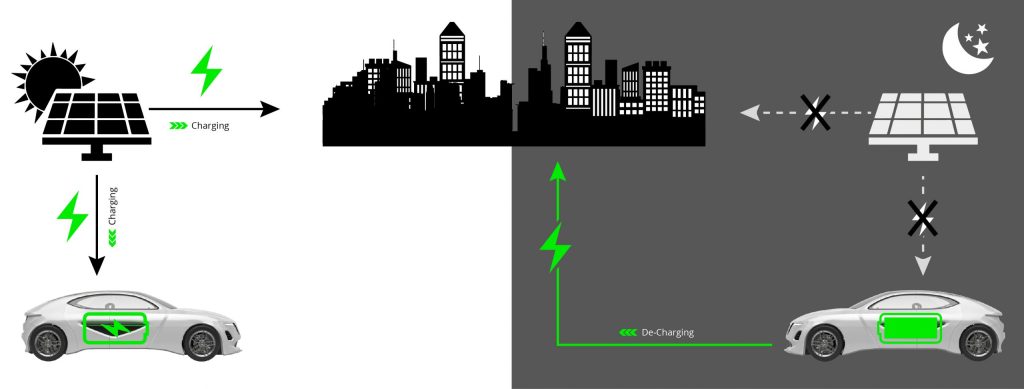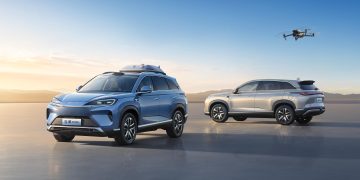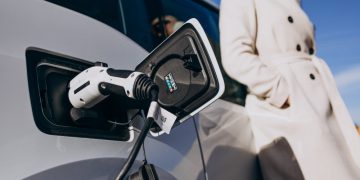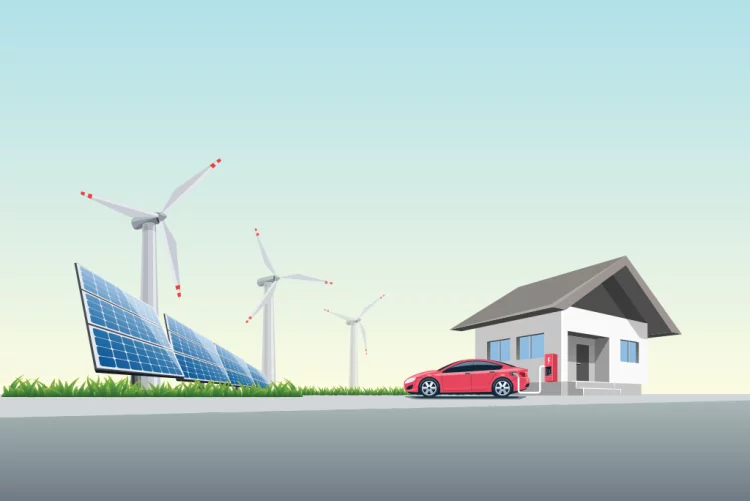Abstract
This article delves into the concept of Vehicle-to-Grid (V2G) technology, exploring its potential to transform energy consumption patterns. It first analyzes the basic principles of V2G technology and then examines its significance in the context of energy transition, carbon reduction in the transportation sector, and cost – saving for users. Additionally, the current development status of V2G technology, including research progress and challenges, is discussed. Finally, it looks into how electric vehicles can power homes using V2G technology and speculates on the future prospects of this innovative technology.
1. Introduction
In recent years, the rapid growth of electric vehicle (EV) ownership and the urgent need for green and low – carbon transformation of the power grid have brought the concept of Vehicle – to – Grid (V2G) technology into the spotlight. V2G technology has the potential to revolutionize the way we consume and manage energy, making EVs not just a means of transportation but also an important part of the energy ecosystem.
2. Concept of Vehicle – to – Grid (V2G) Technology
2.1 Definition and Core Idea
V2G, with its full English name “Vehicle – to – Grid,” represents a technology that enables a two – way flow of electricity between electric vehicles and the power grid. The core idea is to utilize the energy storage capacity of EVs’ batteries as a buffer for the power grid and renewable energy sources. When the grid has excess electricity, such as during periods of high renewable energy generation (e.g., sunny days for solar power or windy days for wind power), EVs can charge their batteries. Conversely, when the grid is under high demand or there is a shortage of power supply, EVs can discharge electricity back to the grid .
2.2 How V2G Works
The operation of V2G technology involves several key components. First, there must be a compatible EV with a battery that can support bidirectional charging. Second, a specialized charging station or infrastructure is required to manage the flow of electricity between the vehicle and the grid. This infrastructure needs to be equipped with advanced control systems to ensure the safe and efficient transfer of power. Communication between the EV, the charging station, and the grid is also crucial. Through smart meters and communication protocols, the grid can send signals to the EVs to indicate when it is beneficial to charge or discharge, based on factors such as grid load, electricity prices, and renewable energy availability.
3. Potential to Transform Energy Consumption Patterns
3.1 Energy Transition
One of the most significant contributions of V2G technology is its ability to facilitate energy transition. In the current global context, countries are striving to shift from fossil – fuel – based energy sources to renewable energy. However, renewable energy sources like wind and solar are intermittent. V2G technology can help address this issue by storing excess renewable energy in EV batteries during peak production times. For example, in a region with a large number of solar panels, on a sunny day when solar power generation exceeds demand, EVs can charge using this surplus clean energy. Then, during the night or on cloudy days when solar power is scarce, the stored energy in the EVs can be fed back into the grid. This not only reduces the curtailment of renewable energy (such as “abandoned wind” and “abandoned solar”) but also encourages renewable energy power producers by providing a more stable market for their output .
3.2 Carbon Reduction in the Transportation Sector
The transportation sector is a major contributor to greenhouse gas emissions. V2G technology can play a vital role in reducing these emissions. By enabling EVs to participate in demand – response programs through orderly charging and discharging, the proportion of green electricity consumed by EVs can be increased. When EVs charge using electricity from renewable sources and then use this clean energy for transportation, the overall carbon footprint of the transportation sector can be significantly reduced. Moreover, the integration of EVs into the energy supply system through V2G helps to optimize the energy mix, further promoting the low – carbon development of road transportation .
3.3 Cost – Saving for Users
V2G technology offers economic benefits to EV owners. In the future, as the power grid system may adjust electricity prices through market mechanisms, similar to how oil prices are regulated, EV owners can take advantage of these price fluctuations. For instance, during periods of low electricity prices (such as at night), owners can charge their EVs at a lower cost. And when electricity prices are high, they can sell the stored electricity in their EVs back to the grid and earn profits. In a two – year experiment conducted by the State Grid in Beijing, an EV owner could potentially earn up to 4000 yuan per year through V2G participation .

4. Advancements in Electric Vehicle Technology Relevant to V2G
4.1 Battery Improvements
The development of high – performance batteries is crucial for the success of V2G technology. In recent years, significant progress has been made in battery technology. Lithium – ion batteries, which are widely used in EVs, have seen continuous improvements in terms of energy density, charging speed, and cycle life. Higher energy density allows EVs to store more electricity, increasing their potential contribution to the grid. Faster charging speeds reduce the time required for EVs to charge, making it more convenient for them to participate in V2G programs. Additionally, longer cycle life means that the batteries can withstand more charge – discharge cycles without significant degradation, which is essential considering the frequent bidirectional energy flow in V2G applications.
4.2 Charging Solutions
The availability of efficient charging solutions is another important aspect. The development of fast – charging stations and bidirectional charging stations has enhanced the feasibility of V2G technology. Fast – charging stations can quickly replenish the battery of an EV, reducing the downtime for the vehicle and enabling it to be ready for V2G operations more rapidly. Bidirectional charging stations, on the other hand, are specifically designed to support the two – way flow of electricity between the EV and the grid. They are equipped with advanced power electronics and control systems to ensure safe and stable power transfer.
4.3 Smart Features
Modern EVs are increasingly equipped with smart features that are beneficial for V2G integration. These features include vehicle – to – everything (V2X) communication, which allows the EV to communicate not only with the grid but also with other vehicles, infrastructure, and even home appliances. Through V2X communication, EVs can receive real – time information about grid conditions, electricity prices, and charging instructions. Smart energy management systems in EVs can also optimize the charging and discharging processes based on factors such as the vehicle’s battery state of charge, the owner’s driving needs, and grid requirements.
5. Current Development Status of V2G Technology
5.1 Research and Pilot Projects
Currently, both at home and abroad, V2G technology is still in the early research stage, and there is no widely adopted commercial standard yet. According to V2GHub website’s incomplete statistics, as of April 2023, there were 92 V2G pilot – demonstration projects globally, distributed across 22 countries and regions, mainly concentrated in Europe and North America. In Europe, there are high expectations for V2G in peak – shaving. The “European 2030 and 2050 Energy Storage Target Research Report” indicates that by 2030, the total energy storage demand in European countries is expected to be at least 187 GWh, with V2G energy storage accounting for 33 GWh .
5.2 Challenges
Despite its potential, V2G technology faces several challenges. One of the main challenges is the impact on battery life. Frequent charge – discharge cycles associated with V2G operations can accelerate battery degradation, reducing the overall lifespan of the battery and increasing the cost for EV owners. There are also technical challenges in terms of standardization. The lack of unified technical standards and communication protocols among different EV manufacturers, charging station providers, and grid operators makes it difficult to achieve seamless integration and efficient operation of the V2G system. Moreover, policy and regulatory frameworks need to be further developed. There is a lack of clear incentives, pricing mechanisms, and market rules to encourage widespread participation in V2G programs.
6. How EVs Can Power Your Home
6.1 Technical Mechanism
Using V2G technology, an EV can power a home in a similar way to how it supplies electricity to the grid. When a home experiences a power outage or when the cost of grid – supplied electricity is high, the EV can be connected to the home’s electrical system through a special adapter or inverter. The inverter converts the direct – current (DC) electricity stored in the EV’s battery into alternating – current (AC) electricity, which is suitable for use in household appliances. The home’s smart energy management system can then control the flow of electricity from the EV to ensure that essential appliances are powered first and that the power supply is stable.
6.2 Benefits for Homeowners
Powering a home with an EV offers several benefits. Firstly, it provides a reliable backup power source during power outages, ensuring the continuity of essential services such as lighting, refrigeration, and medical equipment operation. Secondly, it can help homeowners save on electricity costs. By using the stored energy in the EV during peak – price periods and charging the EV during off – peak periods, homeowners can take advantage of the price difference. Additionally, it promotes the self – sufficiency of the home in terms of energy, reducing dependence on the traditional power grid.
7. Future Prospects of V2G Technology
7.1 Technological Advancements
In the future, we can expect further technological advancements in V2G technology. Battery technology is likely to continue to evolve, with the development of new battery chemistries that offer even higher energy density, longer cycle life, and better safety performance. The standardization of V2G – related technologies, including charging protocols and communication standards, is also expected to improve, facilitating the large – scale deployment of V2G systems.
7.2 Market Expansion
As more EVs are produced and sold, the potential market for V2G technology will expand. With the increasing awareness of energy efficiency and environmental protection, more consumers are likely to be interested in participating in V2G programs. Utilities and grid operators are also expected to play a more active role in promoting V2G technology as it can help them manage grid loads more effectively and integrate more renewable energy into the grid.
7.3 Policy Support
Governments around the world are increasingly recognizing the importance of V2G technology in achieving energy and environmental goals. In the future, we can expect more favorable policies, such as subsidies for V2G – enabled EVs and charging infrastructure, and the establishment of clear regulatory frameworks for V2G market operations. These policies will provide a strong impetus for the development of V2G technology.
8. Conclusion
Vehicle – to – Grid (V2G) technology holds great promise in transforming energy consumption patterns. It has the potential to accelerate energy transition, reduce carbon emissions in the transportation sector, and provide cost – saving opportunities for users. Although it is currently in the early stages of development and faces several challenges, with continuous technological advancements, market expansion, and policy support, V2G technology is likely to become an important part of the future energy landscape. Moreover, the ability of EVs to power homes using V2G technology adds an extra dimension of flexibility and resilience to the energy system, making it a truly innovative and forward – looking technology.











































